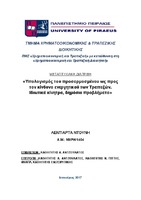Υπολογισμός του προσαρμοσμένου ως προς τον κίνδυνο ενεργητικού των τραπεζών. Ιδιωτικά κίνητρα, δημόσια προβλήματα

View/
Keywords
Τραπεζική λογιστική ; Ισολογισμοί ; Κατάσταση αποτελεσμάτων χρήσης ; Αριθμοδείκτες ; Θεσμικό πλαίσιο ; Βασιλεία ΙΙ ; Βασιλεία ΙΙΙ ; Τραπεζικοί κίνδυνοι ; Χρηματοπιστωτική κρίσηAbstract
The recent financial crisis has highlighted major problems on how the financial institutions operate, as well as the way they are being supervised and controlled. This thesis examines the theoretical/ logical and technical weaknesses of the capital requirement rules of Basel. Theoretical/ logical weaknesses refer to the incentives of all stakeholders, including bank management and supervising authorities. The supervisory framework creates increased regulatory arbitrage opportunities which were exploited by the banks in order to underestimate their Risk Weighted Assets (RWA), taking excessive risks.
On the other hand, technical problems arise from the bold statistical assumptions of the RWA calculation methods. In this thesis we analyze the regulatory capital determination methods under the Basel framework and- through the study of the international bibliography- we highlight the vulnerabilities and suggest effective improvements that will enhance the stability of the banking sector and the economy. The default by any party has a public cost, which is partially beared by the bankrupt institution while the rest is passed over to the taxpayers, negatively affecting the stability of the entire financial system.


